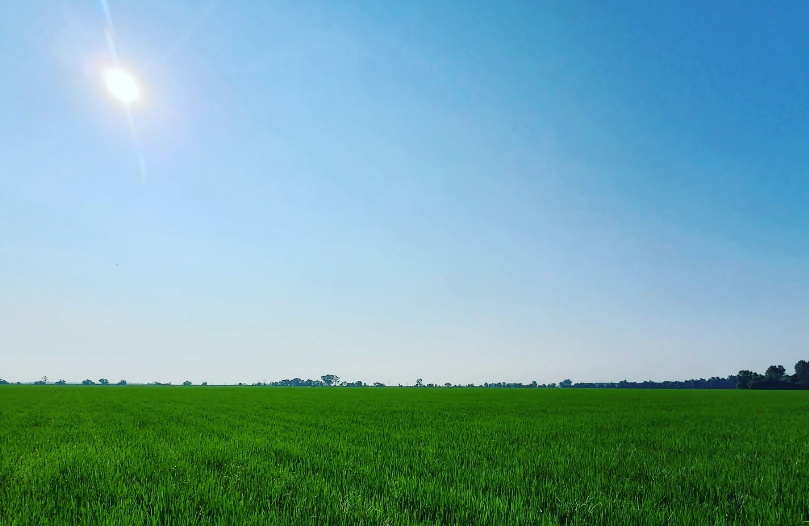Castor River is Leading the Way in Responsible Rice Farming
Regenerative farming is a holistic approach to agriculture that seeks to improve and revitalize the health of the entire ecosystem it's part of, rather than merely extracting resources or optimizing for short-term yields.
This method of farming has gained attention for its potential to address many pressing global challenges, including climate change, soil degradation, and biodiversity loss. Below are some of the key benefits of regenerative farming, which make it a crucial practice for the future of food production and environmental sustainability.
1. Enhances Soil Health
One of the primary goals of regenerative agriculture is to improve soil health. Healthy soil is the foundation of the food chain in both wild and agricultural ecosystems. Practices such as cover cropping, reduced tillage, and the use of natural compost help increase soil organic matter, leading to improved soil structure, water retention, and fertility. This not only boosts crop yields but also makes farms more resilient to droughts and floods.
2. Combats Climate Change
Regenerative farming plays a significant role in mitigating climate change. By increasing soil organic matter, these practices sequester more carbon dioxide from the atmosphere and store it in the ground. This process, known as carbon sequestration, can help offset agricultural greenhouse gas emissions. Furthermore, regenerative agriculture often requires less synthetic fertilizer and pesticide inputs, further reducing its carbon footprint.
3. Supports Biodiversity
Regenerative farming practices encourage a diverse ecosystem. Unlike conventional monoculture, which tends to reduce species variety, regenerative farms often use crop rotations, intercropping, and wild habitats such as hedgerows and ponds to encourage biodiversity. This diversity supports pollinators, improves pest control, and enhances ecosystem resilience.
This is why Castor River Habitat and Farm is called a Habitat and Farm, as it is home to several species of insects, pollinators, pigs, ducks, dairy cows, chickens, and more!
4. Promotes Water Conservation and Quality
By improving soil structure and promoting ground cover, regenerative farming helps conserve water. Better soil structure allows rainwater to infiltrate more deeply, reducing runoff and erosion while increasing the soil's water-holding capacity. This not only makes water more available to crops during dry periods but also reduces water pollution from agricultural runoff, protecting rivers and lakes.
5. Enhances Farm Resilience and Productivity
Farms practicing regenerative agriculture tend to be more resilient to environmental stressors such as extreme weather, pests, and diseases. The improved soil health and biodiversity make these systems more adaptable, often resulting in more consistent and sustainable yields over time. Furthermore, by reducing reliance on external inputs, these practices can also enhance farm profitability.
6. Improves Nutritional Quality of Food
There's growing evidence that regenerative farming practices can lead to crops with higher nutritional value. The enhanced soil health results in plants with better access to nutrients, which can translate into more nutrient-dense produce for consumers.
Moreover, Castor River Habitat and Farm's rice is routinely tested for arsenic levels (a known carcinogen). With each harvest, their grains of rice consistently test for 80-90% less arsenic content than organically grown crops (30 ppb found in Castor River regeneratively grown rice vs. 150-275 ppb found in Organic rice, and 600+ ppb found in conventional rice).
7. Strengthens Rural Communities
Regenerative agriculture can play a role in revitalizing rural areas. These practices often require more labor than conventional farming, potentially creating jobs and supporting local economies. Additionally, by promoting sustainability and resilience, regenerative farming can help ensure the long-term viability of rural communities dependent on agriculture.
In Conclusion...
Regenerative farming represents a paradigm shift in our relationship with the Earth. Rather than seeing land as a mere commodity to be exploited, this approach treats the farm as a living system that can be nurtured and restored.
The owners of Castor River are active participants in broader farmer education to help align more farms' agriculture practices with ecological principles. Regenerative farming offers a promising path forward for food security, combating climate change, and rebuilding healthy ecosystems.
As consumers, supporting regenerative agriculture through our food choices can help drive the change toward a more sustainable and equitable food system for future generations. Shop Castor River regeneratively grown rice here and join the movement today.


